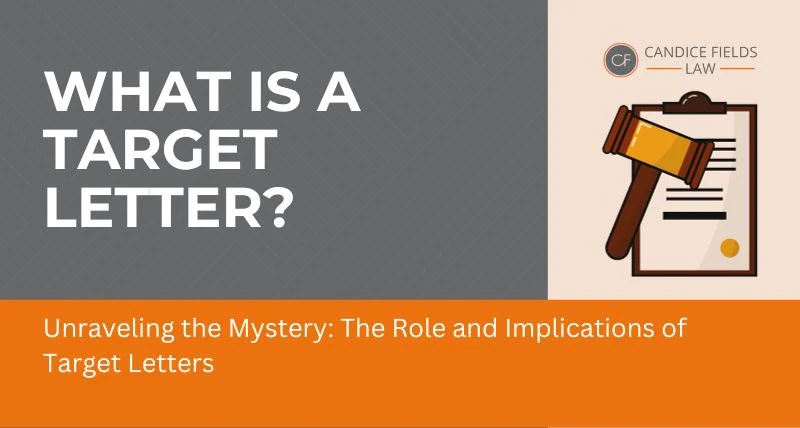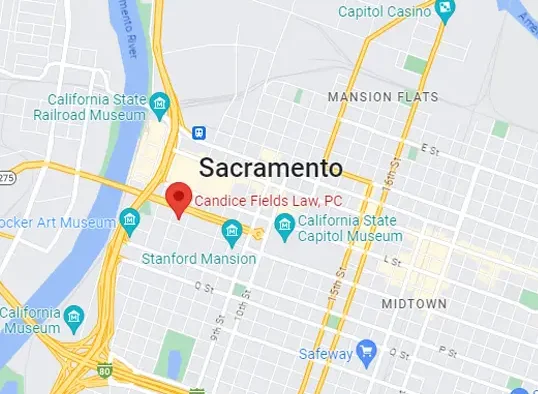What is a Target Letter?

Few documents stir as much unease as a target letter. At Candice Fields Law, PC, we believe empowerment comes through understanding, and we are here to demystify this crucial aspect of federal criminal investigations for you. Though target letters garnered significant attention during high-profile cases like those surrounding former President Donald Trump’s associates, their implications remain a mystery to many. Let’s unpack the enigma together and clarify the steps to take if you ever face this pivotal document.
Need legal assistance?
What is a Target Letter?
A target letter is a notification tool the federal government uses to inform individuals that they are under scrutiny for potential criminal prosecution. Essentially, it signifies that a federal prosecutor is convinced that the recipient is implicated in a crime.
This letter can be issued after attempts have been made to interview the individual, or it can arrive unexpectedly.
Common in white-collar crime investigations, a target letter often represents the initial signal that an individual is being investigated. The United States Attorney’s Manual characterizes a “target” as a prospective defendant against whom significant evidence exists. The letter informs the recipient of several key points, including:
- Their identification as a target in a federal grand jury investigation;
- The specific crime or crimes they are believed to have committed;
- Their entitlement to invoke the Fifth Amendment; and
- Guidelines on securing court-appointed legal representation.
Furthermore, the letter may warn the recipient not to destroy any evidence, highlighting that such actions can be deemed as obstruction of justice. It may also prompt the individual to contact the prosecutor to address the issue.
The Trump Target Letter
Former President Donald Trump received a target letter from the Justice Department, indicating he is under investigation for efforts to overturn the 2020 presidential election. The letter is part of the ongoing probe into the Jan. 6, 2021, Capitol riot. Trump, already facing legal challenges, including an indictment for mishandling classified documents, has denounced the investigations as politicized.
What is In a Target Letter?
What exactly does a target letter contain? Let’s dissect its typical components:
1. Notification of Investigation
The letter begins by informing the recipient that they are the target of a federal investigation. It is an explicit, unequivocal notification that the individual is not just a witness or subject but a specific target believed to have committed criminal offenses.
2. Specific Alleged Crimes
The target letter details the nature and scope of the alleged crimes. It specifies the particular statutes or regulations the recipient is believed to have violated, offering an insight into the focus of the investigation and the potential charges that may be brought against them.
3. Rights of the Recipient
Notably, the target letter delineates the rights of the recipient. It emphasizes the individual's right to remain silent to avoid self-incrimination and the right to legal representation. This section is crucial as it provides the initial guidance on how the recipient can respond to protect their legal interests.
4. Grand Jury Proceedings
The letter often includes information about grand jury proceedings. It may notify the recipient that they are expected to appear before a grand jury, offering details on the proceedings' date, time, and place. This segment underscores the gravity of the situation and the immediate need for legal representation to navigate the complexities of grand jury testimony.
5. Invitation to Contact the Prosecutor
Sometimes, the target letter extends an invitation for the recipient or their attorney to contact the prosecutor. This can provide an opportunity for preliminary discussions, negotiations, or clarifications regarding the investigation.
What To Do If You Receive a Target Letter

Responding to a Target Letter with Candice Fields Law, PC: Receiving a target letter requires immediate, precise, and strategic actions. Here is our recommended course of action:
1. Contact a Federal White-Collar Crim Lawyer Immediately
Contacing a federal white-collar crime lawyer is the first step. At Candice Fields Law, PC, we can interpret, advise, and develop a comprehensive defense strategy tailored to your unique situation.
2. Preserve All Pertinent Records
It is of the essence to retain all related documents, emails, and records that might be relevant to the investigation, ensuring a well-informed defense.
3. Prepare for Grand Jury Proceedings
Our team will guide and represent you during grand jury proceedings, ensuring your rights are protected and your case is presented effectively.
4. Develop a Robust Communication Strategy
We assist in managing communications with stakeholders, media, and the public to safeguard your reputation.
How a Preindictment Federal Criminal Investigations Lawyer Can Help
When facing a preindictment federal criminal investigation, securing the services of a seasoned lawyer is paramount. At Candice Fields Law, PC, we have experience in navigating the complexities of these investigations, offering a robust defense strategy tailored to each client's unique situation. Here’s how we can assist:
Experienced Legal Counsel
We provide informed legal advice, ensuring clients fully comprehend the investigative process, potential charges, and legal rights. Our experience empowers clients to make informed decisions at every stage.
Navigating Interactions with Authorities
Our role includes managing all communications with federal agents and prosecutors. We act as a buffer, ensuring that our clients are treated fairly and their rights are upheld. We also seek to clarify the nature and scope of the investigation.
Assessment and Preparation
We meticulously review all aspects of the case, evaluating the evidence and preparing for potential outcomes. Our proactive approach aims to mitigate risks and address challenges head-on.
Strategic Defense Development
Drawing on our extensive experience, we develop a customized defense strategy. We explore all avenues to challenge the evidence and assertions made by the prosecution.
Protection of Rights
We are steadfast in protecting our client's constitutional rights. We advise on the right to remain silent and the right to legal counsel and ensure that these rights are respected throughout the investigation.
Negotiation and Resolution
Our adept negotiation skills enable us to engage with prosecutors to seek favorable outcomes, including the possibility of resolving the matter before formal charges are filed.
Act Now: Your Defense Starts with Candice Fields Law, PC
Facing a target letter? Swift action and expert legal counsel are crucial. At Candice Fields Law, PC, we’re committed to offering personalized, strategic defense solutions tailored to your unique situation. Don’t navigate this challenge alone - contact us for a confidential consultation and secure your defense today.
Need legal assistance?
Target Letter FAQs
Will I inevitably face an indictment if I receive a target letter?
Receiving a target letter does not automatically mean you will be indicted. It indicates that you are a federal investigation target, meaning substantial evidence links you to a crime. However, with the right legal representation and defense strategy, it is possible to mitigate the situation, potentially preventing an indictment.
Is it mandatory for the government to send out target letters?
The government is not legally required to issue target letters. They are typically sent as a courtesy to inform individuals that they are the target of a federal investigation and to advise them of their rights. It also often precedes a subpoena for records or testimony.
Can a motion to dismiss be filed in response to a target letter?
A target letter is a notification, not a charge or indictment; therefore, there is no procedural basis to file a motion to dismiss it. Your focus should be on seeking legal representation to understand the nature of the investigation and prepare an appropriate response.
What is the time frame for the government to indict me after issuing a target letter?
There is no set time frame. The government can take days, months, or even years to bring an indictment, depending on the complexity of the investigation. The statute of limitations for the alleged crimes will dictate the ultimate deadline.
Do I have the right to be informed if I'm no longer considered a target in an investigation? Can I inquire about my status?
The government is not required to notify you when you are no longer a target. However, your attorney can communicate with the prosecuting office to ascertain your status and negotiate terms of cooperation or even dismissal of potential charges.
How should I respond if I am the recipient of a target letter?
Seek immediate legal representation, preserve all relevant documents and records, and refrain from discussing the case with anyone other than your attorney. Legal counsel will guide your subsequent actions, including communication with the prosecution and preparing for possible grand jury proceedings.
Can I engage in conversations with others who are connected to the investigation?
It is advisable to avoid discussing the investigation with anyone other than your lawyer to prevent possible self-incrimination or misunderstandings. Your attorney will advise you on all communications.
Is it in my best interest to collaborate with the government?
This decision should be made in consultation with your attorney, who will evaluate the specifics of your case, the potential benefits and risks of cooperation, and advise you accordingly.
What additional aspects should I be conscious of if involved in a federal investigation?
Be cognizant of your rights, including the right to remain silent and legal representation. Avoid making any statements or decisions without first consulting with your attorney.
What steps should I take to secure legal representation effectively?
Look for an attorney with experience in white-collar crime and federal criminal defense. Consider their track record, client testimonials, and credentials. Ensure they are adept at handling cases similar to yours and can offer personalized, strategic defense tailored to your specific circumstances.





